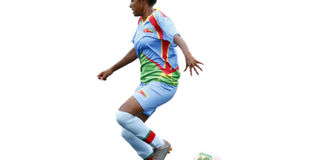The disappearing act of Eritreans over the years

Face the ball or asylum. An Eritrean player finds herself with the ball to her back during the match against Uganda last week. Many Eritreans have used sports engagements to seek asylum. PHOTO/JOHN BATANUDDE
What you need to know:
Mulindwa on possible sanctions by Cecafa
No No No! The Eritrean federation and their government have a big role to play to make the young people love their country. I think the federation should be able to talk to their players before they leave the country.
The first verse of Eritrea’s national anthem talks about the victory over a barbarian enemy. It also mentions sacrifices made by the people to achieve freedom for the country.
The subsequent stanzas praise the country as a comfort for the oppressed.
When the Eritrean footballers stood at attention to sing their national anthem just before their 5-0 thumping by Ethiopia on Tuesday, the words of their anthem written by Solomon Tsehaye Beraki didn’t make sense to five teenagers.
Or perhaps most of them.
Yisehaq Liwam, 16, Mohammed Yordanos Abraham, 17, Raka Shamat Futsum, 18, Kahsay Rahel Michael, 18, and Knfu Trhas Habate, 19, vanished from the team’s camp at Sunset Hotel in Jinja the following morning without a trace, at least by press time.
Police have opened a case of disappearance under CRB 871/2021 and commenced a search.
This is not the first case involving Eritrean players during such events and Cecafa together with the host Fufa says that the issue is beyond their control.
“This matter is out of Fufa and Cecafa’s control, the security agencies will guide us further,” Fufa executive member and Cecafa’s marketing and communications manager Rogers Mulindwa told SCORE.
“It looks like it was planned way back in Asmara. I think they had contacts of people here and Uganda is a hospitable country. But we discourage and condemn it [the habit] because it’s a bad gesture to our game.”
Fleeing government
Thousands of Eritreans often seek asylum, presumably to escape the regime of Isaias Afwerki, who has been in power since 1990. The Septuagenarian has been accused by the United Nations and Amnesty International of gross human rights violations.
A member of the Eritrean community in Uganda, who agreed to speak to this paper on conditions of anonymity, said they were happy for, and envious of the girls and prayed for them to have a better future.
“It is bad, very bad,” they said about the situation back home before breaking down.
Amnesty International’s report for 2020/21 on the State of the World’s Human Rights ranked Eritrea, situated in the Horn of Africa, as the most censored nation in the world. There is no freedom of expression since the authorities banned all non-state media in 2001.
“I wish them well. Anyone should welcome them don’t arrest them and return [them] to hell. They will suffer bad (sic). Maybe [their] families will pay the price, we don’t know. We pray for them. Your country is good, thank God.”
Worrying trend
In 2006, four players of Eritea’s most successful club, Red Sea, disappeared after a Caf Champions League match 4-1 on aggregate to Tusker in Nairobi, Kenya.
Five years later, up to 13 members of the same club sought refuge at the United Nations High Commissioner for Refugees (UNHCR) offices in Dar es Salaam after a Cecafa club championship.
In December 2007, a dozen players and officials of their national team that had beaten Uganda 3-2 in the gCecafa Senior Challenge cup sought asylum in Tanzania.
This forced the government to cancel international engagements.
The decision affected their national team and league champions Al Tahrir. International pressure forced Eritrea to rescind the decision, but not without measures – the authorities set a security fee and family lineage declarations which national team participants were expected to pay and comply with before leaving the country.
“You can’t leave free[ly] even if it’s representing the nation; you must leave something behind. Even your family is known,” another Eritrean reveals.
The measures did not deter their search for freedom. In 2009 only the head coach and one official returned from the Senior Challenge Cup in Nairobi while another 13 disappeared and later reappeared seeking asylum in Dar es Salaam the following year.
More stringent measures were enforced in 2012 for the national to team take part in the challenge cup in Kampala. Yet 17 members of the delegation still filed for asylum.
In 2015, 10 players refused to leave Botswana after a World Cup qualifying match and in September 2019, five players disappeared from their hotel in Jinja just before their U-20 semi-final clash against Kenya. They included Girmay Hanibal, Simon Asmelash, Deyben Gbtsawi Hintseab, Hermon Fessehaye Yohannes and Mewael Yosief.
The four recently released a video through a Twitter account of One Day Seyoum, who define their organisation as a “human rights group campaigning and mobilising to end the suffering of the Eritrean people.”
In the video that has been watched over 11,000 times, Mewael and the other three are seeking help claiming that government agents were out to trace them and, if found, they could be forcefully repatriated – a situation they fear could cost them their lives.
“We are the four football players seeking emergency help,” Mewael, who scored a brace over Zanzibar to push his team to the semi-final in that the tournament in Njeru, leads the clarion call.
“We’re in grave danger and in need of help because if they catch us, it is going to be a severe danger for us; we might face imprisonment, unimaginable punishments and might even cause us death.”
This paper sought an update on their condition from the UNHCR Uganda chapter but had not received a reply by press time.
[email protected]




